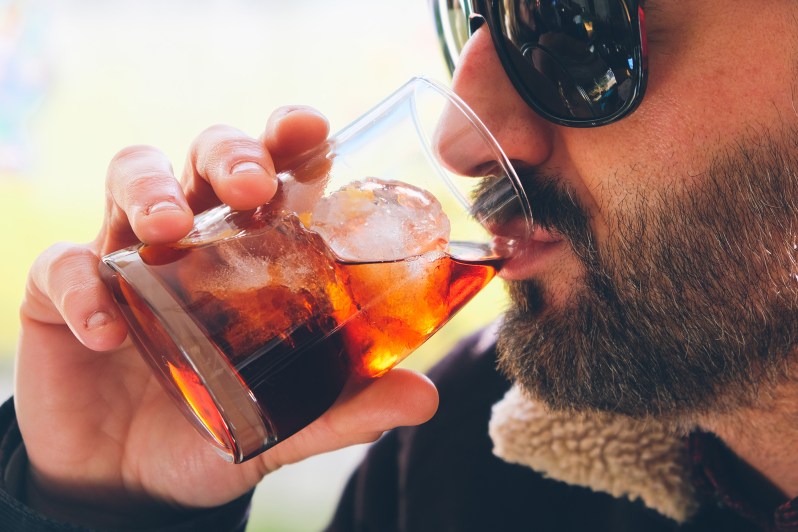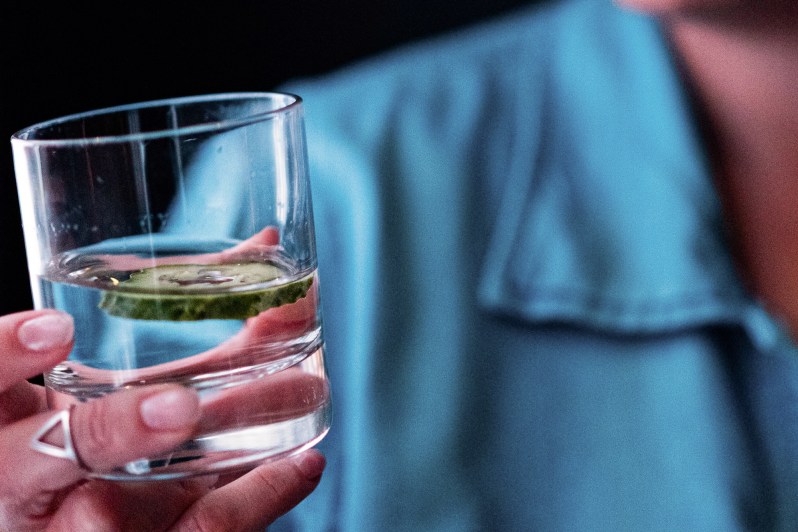Bars and restaurants are closed. Everyone has been stuck inside for months. Our homes have become our everything: Our work offices, happy-hour bars, dine-in restaurants, gyms, movie theaters, and workshops. We miss our friends, family, and normal routines. Some of us have lost jobs or are worried about money. We’re unsure of what even the next few months will hold. We want answers and certainty in an uncertain time. We’re lonely, isolated, anxious, and scared. All this doesn’t make for the most healthy environment in which to drink.

With so much on our mind these days, we all might be hitting the bottle a bit harder than usual. For some, a few extra drinks to help take the edge off isn’t a big deal. But for others who already struggle with their drinking or trying to cut back, being stuck in an isolated environment, away from friends, family, and their normal lives, and living through a stressful and overwhelming global situation, isn’t helping their situation. So people who never even worried about their drinking before may now be noticing that it’s going over the edge. That promised one or two glasses of wine at dinner becomes the whole bottle. Cocktail after cocktail goes down way too easy.
Luckily, although we all may feel like we’re alone in drinking too much just because we’re physically alone, it doesn’t mean that we are. It’s something that many people are struggling with right now, so we turned to the pros — two experts in the fields of alcohol and our relationship to it — for their insight and advice on how to maintain healthy drinking habits during this time.
“I think it’s natural to want to drink right now,” says Kim Crow, an Oregon-based licensed professional counselor who specializes in alcohol abuse and dependence. “Humans have been trying to escape their problems for eons.”
Crow reports that she is seeing many clients, especially those in the late stages of recovery, struggling right now. “I’m seeing more people complain about hangovers during the week,” she says.
We also spoke with the award-winning bartender and writer Jeffrey Morgenthaler. Based in Portland, Oregon, Morgenthaler is akin to a god among craft cocktail aficionados, having created the barrel-aged cocktail trend and helmed the famous bar programs at Clyde Commons and Pepe Le Moko. As someone who’s been working in the bar industry since 1996, he has plenty of experience working with booze and keeping a healthy relationship with it.
If you’re starting to get worried about your drinking or that of a loved one, Crow says that “there are a few signs to look for,” and both she and Morgenthaler had plenty of sage advice for quarantine drinkers.
Set Limits and Stick to Them
Setting limits for yourself about how much you’re going to drink on a given day and then sticking to them is one of the best stands you can take against over-drinking right now. We all miss the social aspects of drinking, so we may be compensating by going too hard too fast, especially without the usual buffer of our drinking friends to help keep us in line. That, plus the fact that we’re all stuck at home with nowhere to go, can make it easy for that one glass on the Zoom happy hour can turn into “Oh, might as well have more.” But knowing your limits and stopping when you reach them is essential.

“If I am drinking, I’ll set myself limits before I even start,” says Morgenthaler. “Like, to only have two glasses [of wine] and then use the rest for cooking.”
“It gives you a lot of info about your ability to set and maintain limits,” Crow says.
Make Conscious, Deliberate Choices to Not Drink
Being conscious and intentional about your choices during this time is another way to keep your drinking in check, says Morgenthaler, who has been taking a break from drinking during this quarantine.
“Every day I have to make the decision not to have any alcohol,” he says. “To get up, go for a walk, and do things. It’s about living with more intentionality.”
Setting yourself goals and intentions, making the choice to make better decisions, being more conscious of your actions; these are just some ways to be more cognizant of your drinking habits. We all have the power to say no and stick to our guns. Mind over matter.
“If you don’t want to drink, just don’t,” Morgenthaler says.
Replace the Ritual
Many of us enjoy unwinding with a nice glass of wine at the end of the day, which is all well and good. This becomes a sort of habit or routine; a ritual, even, something ingrained in our daily habits that brings us comfort. But if you’re finding that that glass of wine or cocktail at the end of the day snowballs into something that you actively depend on, maybe it’s time to re-evaluate and replace that ritual. Replace the act of drinking with something else.
“Finding healthy substitutions is a great way to go,” Crow says.
She cites an example of when David Letterman quit smoking and so, instead of using a cigarette, he would eat carrots. The motion and action of bringing the carrot to his mouth felt familiar and normal, allowing him to ease into quitting by still enabling the comforting muscle memory of bringing something to his mouth but without the harmful item.
In a similar vein, Crow also says that finding new hobbies or activities helps distract you. Make some bread, solve a puzzle, work out, knit: There are tons of ways to keep your hands and mind busy.
Try to Abstain
Morgenthaler says that taking a break from drinking every other day or so (or longer) also helps.
“I’ve been coaching a lot of my friends … and they’re always happy to abstain,” he says.

Abstaining helps take the pressure off by offering a stepping stone to better control. Saying “I can’t drink today” can be a lot easier than saying “I can’t drink for a week.” It’s about taking smaller steps; walking before you can run.
“You can still drink,” Morgenthaler says. “Just not every day.”
Stay Connected to Loved Ones
Crow says that right now, it is especially important to stay connected with your friends and family and be honest with them about what you’re going through.
“Talking with others … it helps us feel OK to be more in our anxieties,” she says.
Sharing your concerns, uncertainties, fears, and anxieties with people you trust and feel safe confiding in can help relieve the emotional burden that can feed into dependence on alcohol and goes a long way in terms of emotional support.
If You Think You’re Drinking Too Much, Try CAGE
Crow says that there’s a tool used by counselors, therapists, and other substance abuse experts to help gauge an individual’s relationship with alcohol. CAGE is a simple four-part questionnaire, and it stands for “Cut Back, Annoyed, Guilty, and Eye-Opener.”
To evaluate your relationship with booze, you ask yourself questions based on those words. Have you ever thought to yourself that you should cut back on your drinking? Have you ever been annoyed at someone for criticizing your use of alcohol or other addictive substances? Have you ever felt guilty about your drinking? Have you ever needed to use alcohol or other substances to help you get over a hangover or steady yourself?
Crow says that generally if people answer yes to at least two of those questions, they might have a drinking problem. So if you see your drinking going down a slippery slope right now, it may be prudent to ask yourself these questions.
Reach Out If You Need It
Crow encourages anyone questioning their drinking habits right now to “reach out for help.”
“It doesn’t have to be a counselor, it can be a friend or a loved one,” she says. But sharing your concerns with someone you trust and having someone else out there who knows to check in with you and act as a “source of accountability” can be key to helping you feel like you’re not alone in the fight.
You can also check out the March 11 episode of The Manual Podcast, where award-winning chef Gabriel Rucker sits down to discuss the subject of drinking in quarantine.
If you are struggling with alcohol right now, you can also turn to these resources for help: Substance Abuse and Mental Health Services Administration helpline, Alcoholics Anonymous.



